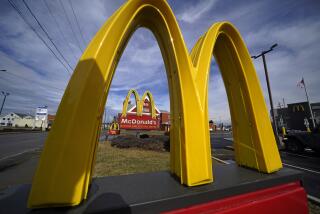Hudson Seeking New Beef Buyer, Mulls Plant Sale
- Share via
Hudson Foods Inc. wants to sell its state-of-the-art beef processing plant in Nebraska if it can’t replace Burger King as a customer of its ground beef, the company’s chief financial officer said Monday.
Burger King, a unit of Grand Metropolitan, over the weekend said it would no longer buy Hudson hamburger after a recall of Hudson beef patties caused shortages at some of its restaurants.
In the largest food recall in U.S. history, Hudson pulled all product that came from its Columbus, Neb., plant, about 25 million pounds, after some ground beef produced at the plant was found to be contaminated with E. coli bacteria.
“We have a two-pronged attack: one is to find a major user of raw beef patties” to replace Burger King, CFO Charles Jurgensmeyer said. “The other is to see if someone else would rather own the plant than us.”
Hudson shares fell 88 cents to close at $14.31 on the New York Stock Exchange. Since Jan. 3, shares in Hudson Foods have lost 22% of their value because of weak sales of poultry, the dominant part of its business.
“Losing any customer is a big loss,” Jurgensmeyer said. “It equates to about $60 million in sales.” Total sales for the Nebraska plant in 1996 were $91 million, with Wal-Mart Inc., Safeway and Boston Chicken making up the remaining sales.
Rogers, Ark.-based Hudson is the third-largest publicly traded poultry company in the U.S., after first-ranked Tyson Foods Inc. and No. 2 ConAgra Inc.
Investors are likely to welcome a sale of the plant, an analyst said.
“If given the opportunity, they should stick with their core competency, and poultry is where it’s at,” said Peter Swann, who follows Hudson Foods for Olde Discount Corp., a brokerage in Detroit. “I’d view it as positive.”
Hudson Foods, as a result of the recall, also is likely to show a loss for its fiscal fourth quarter, Jurgensmeyer said. He declined to provide an estimate because it isn’t clear how much hamburger will be returned, how long the plant will be closed, or how quickly the plant could be sold or a new customer found.
Most analysts, he said, expected a profit of 15 cents to 20 cents per share in the quarter, which ends in September. “We will have a loss for the fourth quarter,” he said.
That compares with income of $8.8 million for the fourth quarter of 1996, or 29 cents a share, on sales of $370.3 million.
The plant, about 2 years old, cost Hudson about $35 million, he said, and was built exclusively to Burger King specifications. “That’s the reason we got into the beef business,” he said. “We really didn’t expect them to pull out,” he said.
Burger King said it wouldn’t consider buying hamburger from Hudson Foods. “Right now, that’s a final decision,” said Mark Giresi, general counsel to the fast-food chain.
Burger King will seek from Hudson Foods unspecified compensation for “costs and expenses” linked to the removal of potentially tainted beef, and “damage” resulting from loss of customer goodwill, he said.
USDA investigators continued their search of plant records in Nebraska and Arkansas, attempting to trace the source of the E. coli contamination.
More to Read
Inside the business of entertainment
The Wide Shot brings you news, analysis and insights on everything from streaming wars to production — and what it all means for the future.
You may occasionally receive promotional content from the Los Angeles Times.










